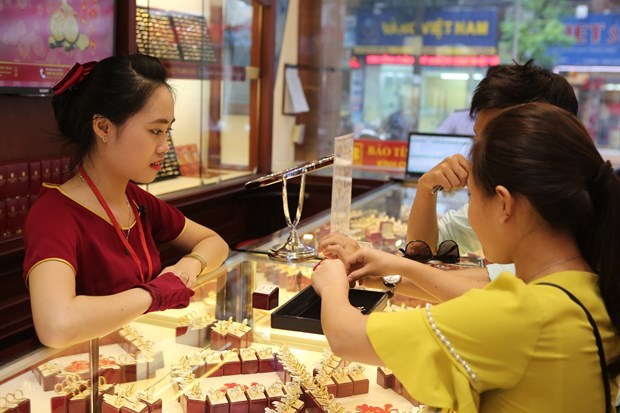Local demand for gold bars and coins dropped by 5 per cent year-on-year from 9.6 tonnes in the second quarter last year to 9.1 tonnes in the same period this year.

Demand for gold in Việt Nam shrank 9 per cent in the second quarter this year compared to the same period last year due to the economic difficulties, according to the World Gold Council.
In a recent report, the council said Vietnamese purchased 12.8 tonnes of gold in the second quarter of 2023, down 1.3 tonnes year-on-year.
According to the council, Việt Nam’s economy experienced sluggish growth in the first two quarters of this year, affecting local market sentiment and jewellery demand.
Local demand for gold bars and coins dropped by 5 per cent year-on-year from 9.6 tonnes in the second quarter last year to 9.1 tonnes in the same period this year.
Meanwhile, demand for gold jewellery fell from 4.5 tonnes to 3.7 tonnes.
Shaokai Fan, Head of Asia-Pacific (excluding China) and Global Head of Central Banks at the World Gold Council, said the Q2 downward trend in Việt Nam was like those in other markets in the ASEAN region.
The demand for gold bars and coins was also limited due to low liquidity, affected by the downturn of the stock market and real estate, he added.
In fact, visitors to gold shops in many streets specialising in selling gold in Hà Nội, such as Trần Nhân Tông, Cầu Giấy and Hà Trung have also been quite gloomy.
In the first half of this year, the domestic gold market also saw no price fever. The gold price inched up and down only in the range of VNĐ50,000-VNĐ300,000 per tael, depending on each trading session.
Meanwhile, the gap between buying and selling price of gold remained high at around VNĐ1 million per tael, which often caused gold buyers to suffer heavy losses as soon as they bought the metal.
The General Statistics Office also reported the gold price index in July 2023 decreased by 0.03 per cent compared to the previous month. On average, in the first seven months of 2023, the gold price index increased by only 1.06 per cent, a low level compared to the same period in recent years.
Besides the economic difficulties, one of the policies affecting the domestic gold market is Decree 24/2012/NĐ-CP which regulates the management of gold business and the State Bank of Vietnam (SBV)'s exclusive right to import gold bars. Since the decree took effect in 2012, the SBV hasn’t almost imported gold. The scarcity of supply is one of the reasons why the domestic gold market has been quite different from the global market.
After more than ten years of being in effect, in a recent report sent to the National Assembly, SBV’s Governor Nguyễn Thị Hồng informed about the review and assessment of the implementation of Decree 24/2012/NĐ-CP on gold business management.
Accordingly, in 2022, the SBV held a meeting with the Vietnam Gold Business Association and 33 credit institutions and enterprises engaged in the gold bar business to collect their opinions on the policy. The participants at the meeting all agreed on the success of Decree 24 in stabilising the gold market and minimising the goldenisation in the country in recent years.
At the meeting, the participants also agreed that amendments to the Decree 24 must be carefully considered to ensure the country’s goal of anti-goldenisation and limit its negative impacts on the local currency and foreign exchange markets.
The SBV will collect the opinions of relevant ministries, sectors and the Gold Business Association before developing a report on reviewing Decree 24 and send it to the Prime Minister in 2023. — VNS
- Tags
- gold demand





